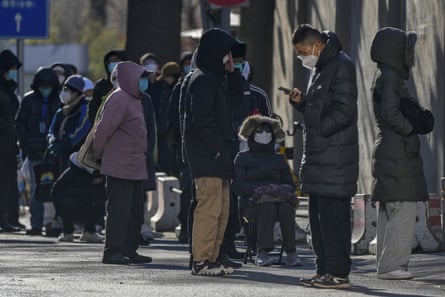
Chinese doctors and nurses are being told to keep working even when infected with Covid-19, staff and residents reported, as the virus rips through the population in the wake of eased restrictions.
Some hospitals in Beijing have up to 80% of their staff infected, but many of them are still required to work due to staff shortages, a doctor in a large public hospital in Beijing told Reuters, adding he had spoken to his peers at other big hospitals in the capital.
All operations and surgeries had been cancelled at his hospital unless the patient was “dying tomorrow”, he said, declining to be named due to the sensitivity of the subject.
A senior World Health Organization official said on Wednesday that China’s flare-up started “long before” restrictions were lifted, but since the sudden shift in policy major cities in Beijing appear to have experienced a huge surge in cases of Covid-19. Authorities have said it is “impossible” to measure, since most people are not being tested.
“The explosion of cases in China had started long before any easing of the zero-Covid policy,” WHO emergencies chief Michael Ryan said on Wednesday. “There’s a narrative that, in some way, China lifted the restrictions and all of a sudden, the disease is out of control,” he added at the UN health agency’s headquarters in Geneva.
“The disease was spreading intensively because the control measures in themselves were not stopping the disease.”
In Sichuan, a doctor surnamed Li told Reuters that their tertiary hospital was “overwhelmed with patients”.
“There are 700, 800 people with fever coming every day,” Li said. “We are running out of medicine stocks for fever and cold. A few nurses at the fever clinic were tested positive, there aren’t any special protective measures for hospital staff and I believe many of us will soon get infected.”
Claims of rampant infections among hospital staff are also spreading across social media. One Chongqing resident said primary care in their city had “imploded”.
“80% of the newly admitted patients in our small third-level respiratory department in a remote city are positive,” they wrote on Weibo.
“From December 8, when the first positive patient was allowed to be admitted, to today, December 13, at least half of the medical staff in our department were infected. At the beginning the infected were allowed to go home to rest, but now as long as it is not very serious symptoms, they are not allowed to go home.”
The Guardian was unable to reach management staff at several hospitals, and health authorities did not immediately respond to queries.

The outbreak is not limited to Beijing, and the sudden pivot in official policy and messaging about the dangers of the virus brought alarm and fear to some. Residents across other major cities told the Guardian it felt like “positive cases are everywhere”.
A Chongqing resident said all the teachers at their child’s school were positive and classes had moved online. In Zhengzhou, one person said many businesses had switched to working from home.
A Guangzhou resident said the streets were quiet, with many people at home, but businesses and restaurants were still open. “I tried to call the hospital hotline for fever but no one answered the phone,” she said.
The White House national security spokesperson, John Kirby, said the US government was ready to assist China with the outbreak if Beijing requested. Kirby told reporters that China has not requested help at this stage.
“We have made that point that we are prepared to help in any way they might find acceptable. That was true back when the pandemic was raging, and that is true today,” he said.
The WHO also raised concerns that China’s population of 1.4bn was not adequately vaccinated.
China has said about 90% of its population is vaccinated and its National Health Commission (NHC) on Wednesday announced it would roll out the second booster shots for high-risk groups and elderly people over 60 years old.
Data from the NHC show vaccinations have been ramping up in recent days. The latest official data shows it administered 1.43 million shots on Tuesday, well above the November rate of 100,000-200,000 doses a day.
Reuters contributed to this report


